 Business Solutions
, SAAS
Business Solutions
, SAAS

21 April, 2024

Do e-commerce SaaS companies dramatically change online businesses? Yes, they do. E-commerce SaaS companies such as Shopify, WooCommerce, Big Cartel, etc provide the tools and features you can leverage to optimize your store potentially.
SaaS eCommerce platforms help find your target customers, enhance your business discoverability, manage the technical side of things, and boost revenue.
But which eCommerce SaaS platform should you choose? The market is saturated and it’s easy to feel confused when looking for the best option. Don’t fret since we’re here to help you.
We’ve listed 9 best eCommerce SaaS companies with their details. We will give you an overview of the platforms, their unique features, pricing points, and pros & cons.
Ready to explore and learn more about the best eCommerce SaaS companies?
Contents
| SaaS eCommerce Companies | Best for | Monthly Price Range (including different plans) | Special Features | Marketing Tools |
| Shopify | All types of businesses | $19-$2300 | In-depth analytics and reporting, custom storefronts, AR/3D/product video support | Advanced marketing and SEO tools |
| BigCommerce | Medium to large businesses | $29.95- customized plans | Multi-channel sales support (online, in-store, mobile) | Advanced SEO tools |
| WooCommerce | All types of businesses | Varies (free plugin, paid hosting, domain, theme) | Open-source platform for extensive customization | Simplified coupon system, extensive plugin library |
| Wix | Small to medium-sized businesses | $4.5-$35 | Drag-and-drop editor, free hosting, and mobile optimization | Available business and marketing tools |
| Shift4Shop | US-based businesses | $0-$1999+ | Free plan, extensive customization options | Built-in tools for SEO, email marketing, affiliate management |
| Salesforce | Medium to large-size businesses | Highly varies according to small businesses, sales, marketing, etc | Unified commerce solution (digital & physical sales channels), robust order management | AI-powered automation |
| Volusion | Medium to large businesses, drop shippers | $29-$299 | Budget-friendly, a wide range of integrations (Amazon, eBay) | Advanced SEO marketing tools |
| Big Cartel | Small to medium businesses, artists | $0-$19.99 | Free plan, simple and user-friendly for artists | Basic SEO tools, offers, discounts, promos |
| Ecwid | Small to medium businesses | $0-$105 | Multi-channel selling, eCommerce hosting even in free plans | Basic SEO tools |
The SaaS (Software as a Service) model allows you to get internet-based access to software applications on a cloud platform. This means the software is available for you in exchange for a subscription-free (monthly or yearly fee).
After getting access to establish an online store on their platform, it’s your responsibility to set up and design your e-store. SaaS providers make sure that the platform operates smoothly.
However, you need to manage the building and designing part of your e-store.
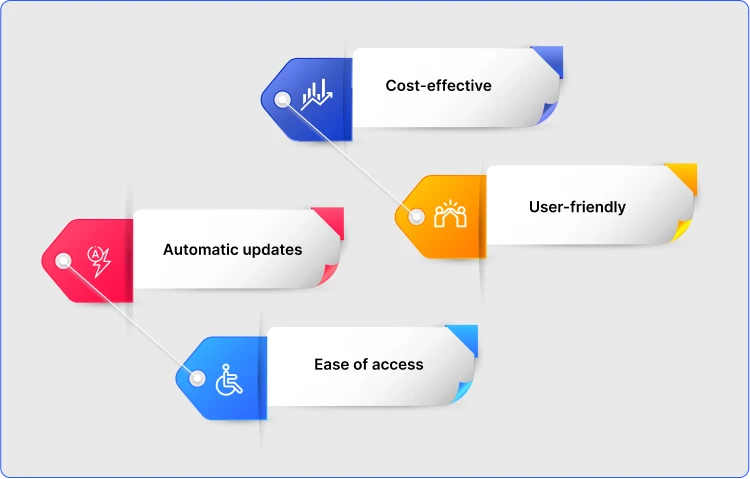
Now, let’s talk about why SaaS e-commerce is special and its benefits:
There are three types of E-commerce platforms you should know about. Here’s a rapid comparison before we get into the details of E-commerce SaaS companies.
| Comparison Factors | On-premise E-commerce | Open-source E-commerce | SaaS E-commerce |
| Deployment | Requires own servers and IT staff | Self-hosted, requires technical knowledge | Hosted by a third-party vendor |
| Cost | High upfront costs, lower ongoing costs | Free to use, but additional costs for hosting and maintenance | Subscription-based pricing |
| Control | Full control over the infrastructure, security, and updates. | It varies based on the implementation | Limited control, as it’s managed by the vendor |
| Customization | Highly customizable | Highly customizable | Less customization since it depends on the vendor’s offerings. |
| Maintenance | Very high | High | Low |
We won’t make you wait for longer. Let’s get to the main point of our discussion now.
Shopify stands out as a leading SaaS e-commerce platform. It offers an easy interface and a comprehensive set of features to support any size business platform.

It simplifies the creation and expansion of your online presence with excellent tools and solutions. Shopify also offers secure and reliable transaction handling so your payment information is protected.
| Factors | Details |
| Number of Collaborating Brands | 10,000+ |
| Languages Supported | 21 |
| Countries Covered | 175 |
| Sales Revenue | 25LCr INR |
| Plan | Price |
| Basic Plan | $19/Month |
| Professional Plan | $49/Month |
| Advanced Plan | $299/Month |
| Plus | $2,300/Month |
BigCommerce shines as a top SaaS e-commerce company. It actively streamlines the sale of products and services online with its wide range of features. It allows your business to quickly set up and customize.
The platform is user-friendly and supports a variety of professional designs that will represent your brand’s identity.
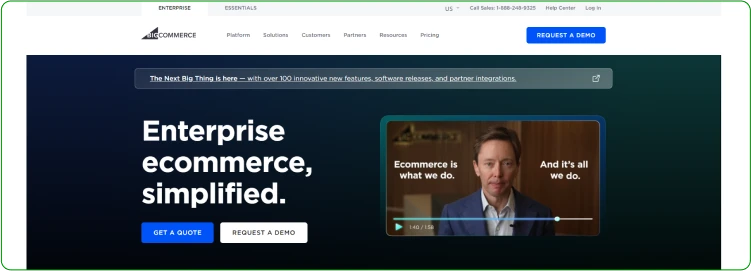
Moreover, BigCommerce levels up your store visibility with strong SEO tools and runs smoothly with popular third-party apps and marketplaces.
| Factors | Details |
| Free Trial | 15 days |
| Online Stores Powered | Over 60,000 |
| Built-in Features | 100+ |
| Support | 24/7 |
| Track Record | 85% of issues solved on the first call |
| Plan | Price |
| Standard | $29.95/Month |
| Plus | $79.95/Month |
| Pro | $299.95/Month |
| Enterprise | Contact sales for custom pricing |
WooCommerce is another popular choice of SaaS e-commerce platform. It helps your business to easily create and manage online stores with its user-friendly interface and customizable templates.
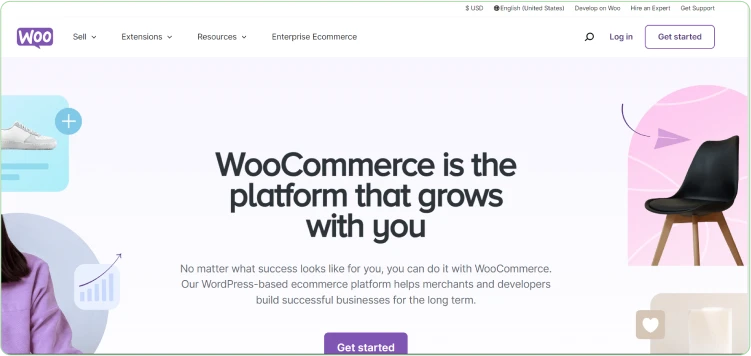
This platform offers a smooth shopping experience through secure payment gateways and flexible shipping options. Worth noting that WooCommerce’s scalability suits businesses of all sizes and features.
| Factors | Details |
| Plugin for | WordPress |
| Extensions | 300+ free and paid |
| Global Meetups | 80+ |
| Payment Gateways | Pre-installed, secure options |
| Engineering Team | 58+ members |
| Mobile App | Yes |
| Money-back Guarantee | 30 days |
| Cost Item | Price Range |
| WooCommerce Plugin | Free |
| Hosting | $120 per year (on average, but varies widely) |
| Domain Registration | $15 on average |
| Theme | $20 to $100 per year |
Wix stands out for its ease of use. It offers a drag-and-drop interface and a huge collection of templates that are both stylish and functional.
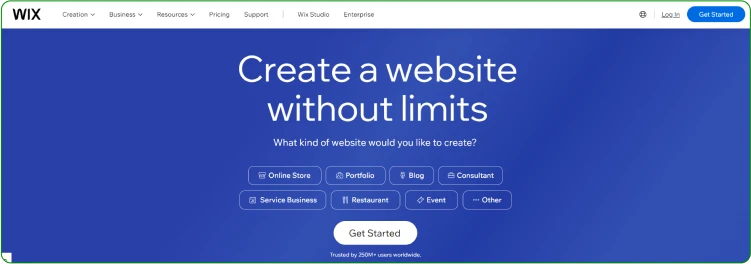
The platform is designed to be fully mobile-optimized, so, your online store will provide the best shopping experience on any device. You are not going to need any coding skills to create professional-looking websites while using Wix.
| Factors | Details |
| Templates | 900+ free, mobile-optimized templates |
| Applications | 300+ apps for enhanced functionality |
| Hosting | Free secure hosting with 99.9% uptime |
| User Interface | Drag-and-drop |
| Plan | Monthly Price |
| Connect Domain | $4.50 |
| Combo | $8.50 |
| Unlimited | $12.5 |
| VIP | $24.5 |
| Business Basic | $17 |
| Business Unlimited | $25 |
| Business VIP | $35 |
Shift4Shop, formerly known as 3dcart, is a free e-commerce platform (free for US customers only) that suits all sizes of online businesses.
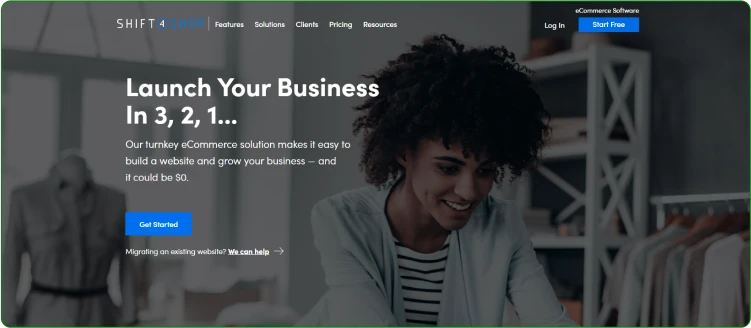
It stands out in the crowd for offering a wealth of customization options and features. You’ll get everything from SEO tracking to a variety of website templates. These features make it a versatile choice for businesses that want to expand their online presence.
| Features | Details |
| Customization | Extensive customization with website templates |
| Customer Support | 24/7 support via live chat, email, and phone |
| Shipping Integrations | Automated shipping rate calculator; integration with major carriers like UPS, FedEx, and USPS |
| Marketing & SEO | Built-in tools for SEO, email marketing, affiliate management, and more |
| Payment Processing | Integrated, with support for over 100 gateways. |
| Free Theme | 100+ with more being added every day. |
| Plan | Monthly Price |
| End-to-End eCommerce | $0 |
| Basic Store | $29 |
| Plus Store | $79 |
| Pro Store | $229 |
| Enterprise Store | Starting at $1,999 |
Salesforce Commerce Cloud, once known as Demandware is another leading SaaS e-commerce platform.
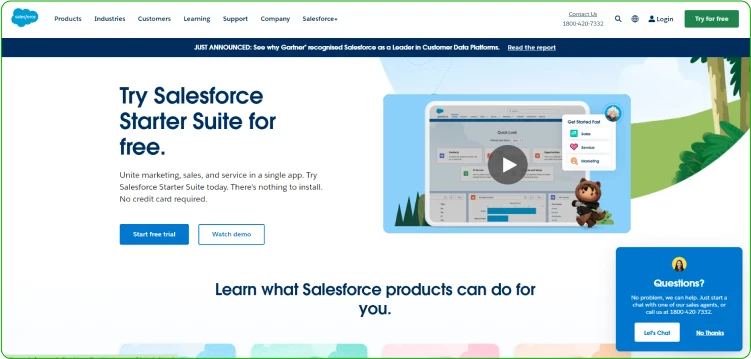
It empowers businesses to launch and manage their online stores efficiently. It also provides a suite of features that enhance customer shopping experiences and streamline business operations.
| Features | Details |
| Customer Base | 150,000+ companies growing their business |
| Performance Boost | Sales: 26%+, Happier Customers: 26%+, More Leads: 32%+ |
| AI and Security | Einstein AI integration for personalized experiences |
| Setup | Seamless B2C and B2B setups |
Salesforce Commerce Cloud doesn’t offer public pricing. They provide custom quotes based on your business needs. Contact their sales team for details. Still, to give you an idea about the prices, here are the price packages for E-commerce businesses.
| Sales Plans | Pricing Structure |
| Starter Suite | $25/Month |
| Professional | $80/Month |
| Enterprise | $165/Month |
Volusion is another useful SaaS e-commerce platform that helps your business establish and expand its online presence.
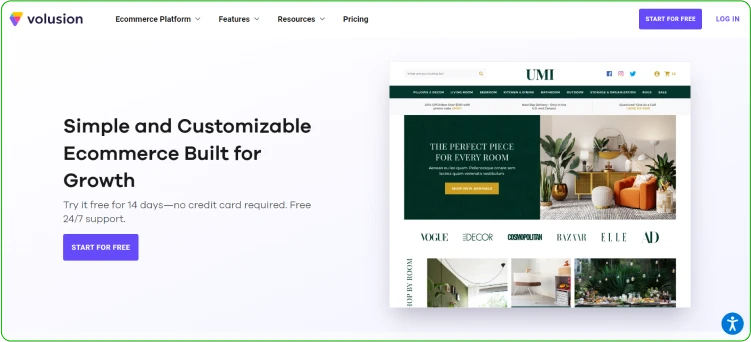
Renowned for its user-friendly interface, Volusion offers an easy setup of online stores. It doesn’t require extensive technical know-how. It offers a blend of powerful tools and flexible templates.
| Feature | Details |
| Customization | Moderate |
| Uptime Guarantee | 99.9% uptime |
| Analytics | Extensive reports and tracking |
| User Interface | User-friendly |
| Product Management | Inventory and warehouse management, product display customization |
| Customer Support | 24/7 support, including live chat. |
| Plan | Monthly Price |
| Personal | $29 |
| Professional | $79 |
| Business | $179 |
| Business Plan | $299 |
If you’ve been looking for a specialized SaaS e-commerce platform designed to support artists, creators, and small businesses, Big Cartel is one of the best eCommerce SaaS Companies. It helps you launch and manage your online stores.
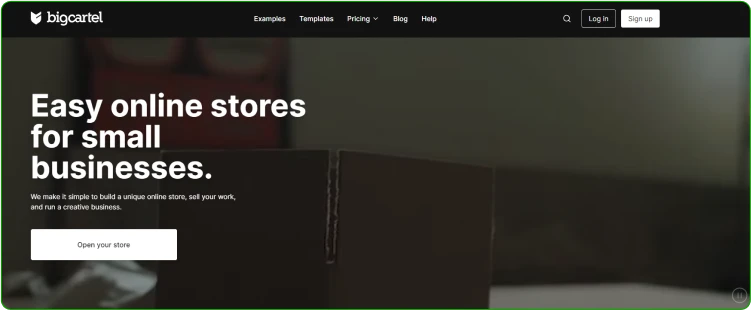
Widely used for its simplicity and affordability, Big Cartel offers a wide range of features that meet the unique needs of creative entrepreneurs.
| Features | Details |
| Target Audience | Artists, creators, small businesses |
| Customization | Free customizable themes, customizable with CSS and HTML |
| Marketing | Offers, discounts, promos, basic SEO tools |
| Sales Features | Sales tax autopilot, real-time statistics, shipment tracking |
| Payment Gateways | Stripe, Apple Pay, PayPal |
| Plan | Products | Monthly Price | Features |
| Gold | 5 | $0 | Basic features, 1 image per product |
| Platinum | 50 | $9.99 | Advanced features, 5 images per product |
| Diamond | 500 | $19.99 | All features, 5 images per product, theme code editing. |
Ecwid is another comprehensive and user-friendly platform. Ecwid makes it easy for your business to launch, manage, and scale its online stores.
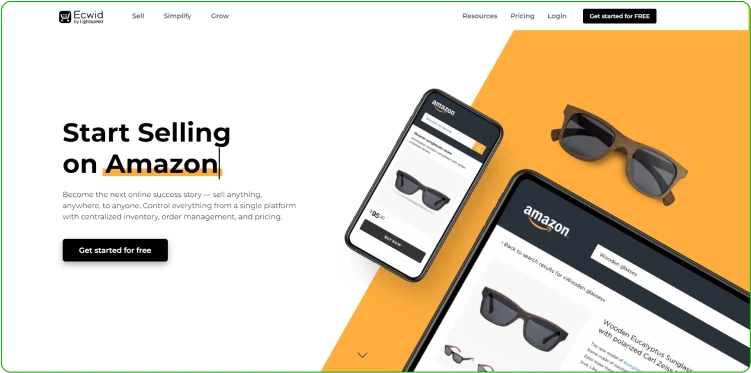
Ecwid is popular for its ability to integrate seamlessly into existing websites, social media platforms, and even in-person sales through point-of-sale (POS) devices.
| Features | Details |
| Sales Channels | Online store, social media, marketplaces, in-person POS |
| Payment Options | Over 50, including built-in processing and automated taxes |
| Multi-channel Management | A unified dashboard for managing multiple sites and channels |
| Compliance | Level 1 PCI compliance for top-tier security |
| Support | Help center, live chat, email, and phone support (weekdays) |
| Plan | Monthly Price (Billed Annually) | Monthly Price (Billed Monthly) | Features |
| Free Plan | $0 | $0 | Basic functionality, up to 5 products |
| Venture Plan | $21 | $25 | Advanced features sell on social media, up to 100 products |
| Business Plan | $39 | $45 | Enhanced tools for growth, up to 2500 products |
| Unlimited Plan | $89 | $105 | All features included unlimited products. |
By now, you know a lot about the popular SaaS e-commerce companies. Still, we’d like you to consider some key factors before you hit any call to action.
Make sure you know the answers to these questions below-
What are you going to sell? Services, digital downloads, or physical products? Know these answers because different platforms offer different options.
Next, ask yourself about the size of your business. Do you already have a large and established audience or customer base? Or, is your business going to be a startup? You need to pick a platform that’s scalable for your business size.
Check the features that are the most important for you. After that, look for additional features that can enhance your overall user experience. Here are some core E-commerce features that you should get from your platform:
These are just examples. Make sure you are sure about the features your business needs and you get them from the chosen platform.
Don’t overlook the design and customizability of your e-commerce site. Statistics show that 60% of customers abandon their purchases due to poor website experience. And, it’s not just about losing sales. Nearly 48% of all businesses are embarrassed by their own websites.
Therefore, you must prioritize user experience (UX) on your website to offer a smooth and enjoyable shopping experience.
How your chosen platform processes online transactions matters in the overall shopping experience. According to statistics, 9% of online shoppers do not proceed with their purchases if they don’t find their preferred payment options.
First, identify the default payment gateways of your chosen platform. Then, check if you can integrate paid popular processors. How does this help?
Imagine your customer doesn’t have a credit card in hand and your site doesn’t accept PayPal, it can lead them to abandon shopping carts then and there.
Check also: Top 10 Types of SaaS Payment Solutions: Pros and Cons

SEO and marketing features help you get a larger customer base, promote your brand, and eventually grow your business.
These are some marketing tools you should get with your e-commerce platform:
It’s always wise to consider long-term costs when you look for an e-commerce platform. Make sure you get a satisfactory number of features and benefits from the platform.
Moreover, know that there might be hidden or additional costs for themes, extensions, or marketplace integrations. Make sure you are aware of them before starting the journey.
Studies show businesses leverage around 371 different SaaS applications on average. However, the number can vary according to company size. Smaller businesses use around 253 apps, and enterprises use around 473 apps!
Search, cart, and payment are the three essential SaaS eCommerce platform features. The Search feature allows the customers to find what they want. A user-friendly shopping cart helps them add and manage their chosen products. And, a smooth checkout with secure payment processing builds trust and allows them to complete their purchases.
If you prefer user-friendliness, Shopify is better than WooCommerce. It’s ideal for beginners with built-in features and a good app store. However, it’s less customizable and more expensive than WooCommerce.
We are done with the long discussion regarding eCommerce SaaS companies. We hope that you’ve already picked the right platform based on your preferences. If you still haven’t figured it out, here’s a summary for you.
Shopify is the best option for all types of businesses. It’s beginner-friendly and offers an effortless e-store setup. If you’re a WordPress user, pick WooCommerce from the crowd as it’s specifically designed for WordPress users.
If you need a budget-friendly option, choose something from Wix, Volusion, or Big Cartel.
No matter which platform you choose finally, make sure it offers the key features for your business. Good luck with your journey!
Check also: Live Chat Customer Service in 2024 [10 Examples]